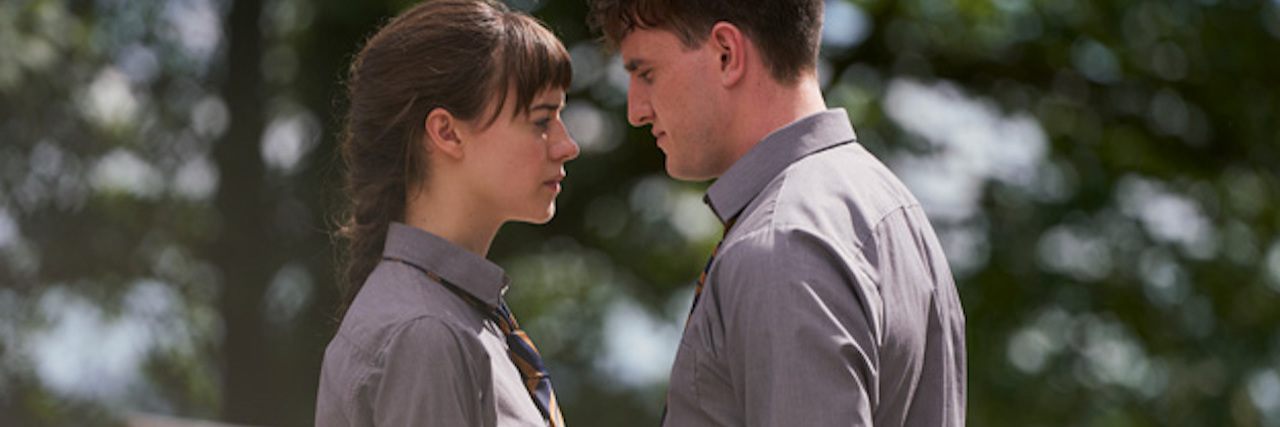Hulu's New Series 'Normal People' Highlights the Cycle of Abuse in Romantic Relationships
Editor's Note
If you’re looking for creative inspiration, check out the Daily Inspirations group on The Mighty.
“Normal People” is a new Hulu series based on the 2018 Sally Rooney novel of the same title. The series follows two Irish young adults, Marianne (played by Daisy Edgar-Jones) and Connell (played by Paul Mescal), through their final year of secondary school and their undergraduate years at Trinity College in Dublin. Although the show jumps around a bit, it primarily focuses on Connell and Marianne’s unbreakable bond and romantic attraction. The two, who come from very different walks of life, continuously seem to weave in and out of each other’s romantic lives.
Although the series is already making headlines for a multitude of reasons, I instantly found myself drawn in because of Marianne and her obvious emotional struggles.
On the surface, Marianne seems to have it all: She’s wealthy, brilliant and oftentimes home alone. However, you’ll quickly learn that there’s so much more than what meets the eye. As the series progresses, it becomes increasingly obvious that Marianne struggles with severe depression and low self-esteem caused by years of emotional, and even physical, abuse.
Like Marianne, I remember spending much of my time in school wandering the halls alone. I can still picture those moments and the faces of the boys who would inevitably find me between classes and mock me as I briskly walked down the hallway. Talking to teachers or the school counselor never helped (trust me, I tried), so instead I just tried to find creative ways to travel between classes in hopes of avoiding the torment.
I would often cover up my extreme loneliness and lack of belonging by reading books or immersing myself into extracurricular activities that included large numbers of people, like marching band and theater. No matter where I went or who I surrounded myself with, though, I never seemed to fit in or feel “normal.”
Also like Marianne, my home life rarely provided an escape or refuge. I often ended up in fights with my parents that escalated to shouting matches and, when I behaved poorly enough, physical altercations that involved belts or wooden spoons. Although my father was (and still is) alive, he was rarely home and remained relatively inactive in my life, whereas my mother held me to nearly impossible standards and constantly questioned why I couldn’t just “act normal.”
Because of the parallels between my life and Marianne’s, it’s easy to understand how she ended up in the places she did during her time in college. In fact, my therapist and I recently discussed the ways in which I find comfort in “the demons I know,” and how this leads me to continuously enter into both platonic and romantic relationships that perpetuate a cycle of abuse.
In a 2012 TED Talk, author and women’s rights advocate Leslie Morgan Steiner brings up this very topic. She explains the term “crazy love,” and shares that many people who experience childhood abuse or trauma become almost desensitized or oblivious to the red flags of abusive relationships. This clearly lines up with Marianne’s long line of terrible boyfriends who not only treat her terribly, but also force her to engage in uncomfortable, violent sexual acts.
What’s more, just like me, Marianne longs to feel a sense of love and belonging, and this desperate search forces her to take on the role of a submissive partner who bows to her male counterpart’s every whim. Even now, as I find myself in the middle of an unwanted divorce, I continue to give in to the demands of my partner, just like “Normal People”‘s leading lady.
Just like Marianne, I see myself as “unlovable” and “damaged.” As my therapist has pointed out, these false beliefs cause me to accept cruelty from literally everyone in my life. However, I find comfort in knowing I’m not the only one who does this, and with the appropriate help, I have faith that I can overcome these negative core beliefs I currently cling to.
Although the series ends with somewhat of an awkward cliffhanger, I love the possibilities of a hopeful future that it leaves us with. Marianne finally breaks free from her toxic family and, thanks to Connell, learns that she is worthy of a kind of love that doesn’t come with conditions or physical harm. I hope that any person who has experienced childhood trauma or abuse of any kind can gain that same insight from the series and learn that although there may not be such a thing as “normal people,” that everyone is worthy of life and love without physical harm or debilitating depression caused by years of emotional abuse.
Rating: 
Have you watched “Normal People”? Let us know your thoughts in the comments below.
Header image via “Normal People” Facebook page

